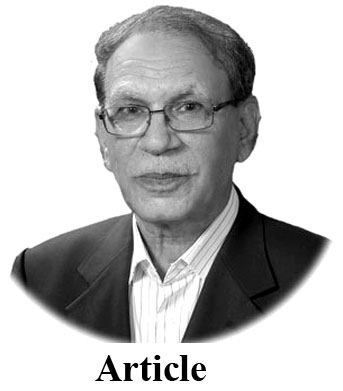Mohammad Jamil
Thousands of people nationwide continued their protest against India’s new citizenship law, which creates a path to citizenship for religious minorities from Afghanistan, Bangladesh, and Pakistan—but excludes Muslims. Critics say it is part of the Hindu nationalist Bharatiya Janata Party’s efforts to marginalize India’s Muslim minority. India’s government has started clamp down on the protests and so far 26 people have been killed and many more injured. Authorities in New Delhi imposed an emergency law that prohibits large gatherings after clashes between demonstrators and police—many on Muslim-majority university campuses. Today, the state of Karnataka enacted a similar ban in at least three cities including Bengaluru, where multinational companies such as Uber and Walmart’s Flipkart are based. Indian-occupied Kashmir is under curfew for the last 140 days, where human tragedy is in the making, as people could not buy items of daily use and medicines.
India is being criticized for its repressive policies against the minorities. Last week, India’s External Affairs Minister Subrahmanyam Jaishankar abruptly canceled a meeting with senior members of Congress after US lawmakers refused demands to exclude a Congresswoman Pramila Jayapal. The decision demonstrates India’s sensitivity over the Kashmir issue, as Prime Minister Narendra Modi defends deployment of more troops, imposing curfews, and cutting off mobile phone and Internet access in India’s only majority-Muslim State. During his visit to Washington, External Affairs Minister Subrahmanyam Jaishankar was to meet the Chairman of the House Foreign Affairs Committee, Rep. Eliot L. Engel (N.Y.); the Committee’s top Republican, Rep. Michael McCaul (Tex.); and others, including Rep. Pramila Jayapal. Indian officials informed the Committee that Jaishankar would not meet with the lawmakers if the group included Jayapal, who is sponsoring a resolution urging India to lift communications restrictions, restore the Internet and preserve religious freedom.
Engel refused, and the Indians pulled out, Jayapal told The Washington Post. “This only furthers the idea that the Indian government isn’t willing to listen to any dissent at all. The seriousness of this moment should have been a reason for a conversation, not dictating who’s in the meeting, which seems very petty.” Tension in India-occupied Kashmir spiked Modi revoked Article 370 of the Constitution, a special status granting autonomy to the region. The Internet shutdown entered its 140th day, making it the longest shutdown of its kind imposed in a democracy, according to the Internet advocacy group Access Now. Modi’s government has defended the restrictions on security grounds. “It’s a missed opportunity,” said Ashley Tellis, an India scholar at the Carnegie Endowment for International Peace. “Minister Jaishankar is incredibly thoughtful and articulate — and not engaging with Congress, which has traditionally been a bastion of strong support for India, is shortsighted.”
Jaishankar’s trip to Washington comes as protests have spread across India over the Citizenship Amendment Act that prevents undocumented Muslims from neighboring countries from seeking Indian citizenship while permitting people of other faiths to do so. Secretary of State Mike Pompeo, who met with Jaishankar, declined to weigh in on the citizenship law despite making the promotion of religious freedom a centerpiece of his tenure as the United States’ top diplomat.
“We care deeply and always will about protecting minorities, protecting religious rights everywhere,” Pompeo said at a news conference. A senior State Department official declined to say whether the citizenship law came up during discussions involving Pompeo, Jaishankar and India’s Defence Minister. In a news conference, Jaishankar defended the citizenship law as a “measure which is designed to address the needs of religious minorities from certain countries,” which was not convincing.
After revoking Articles 370 and 35-A of Indian Constitution that had given special status to Jammu and Kashmir, the final Assam citizens’ list was released, leaving out more than 1.9 million Muslims. After the abolition of Article 370 of the Constitution, 10 other states Arunachal Pradesh, Assam, Himachal Pradesh, Manipur, Meghalaya, Mizoram, Nagaland, Sikkim, Tripura and Uttarakhand that enjoy special category distrust the Indian government because of Modi’s actions. It has to be mentioned that special category status was granted to them by the National Development Council on the recommendations of the Planning Commission to states that needed special consideration. But Modi is playing with fire. Some of the significant separatist movements in India include Naxalites or Maoists, which is second major freedom movement after IOK in India. Maoists inhabit an area known as the ‘Red Corridor’ that stretches from West Bengal to Karnataka state in the southwest.
Though Citizenship Amendment Act (CAA) is considered basically anti-Muslim Law whereby two million people have been denied citizenship. Anyhow, apart from Muslims other communities are also protesting against CAA, and six states said they will not implement the Act. To express their anger against Modi’s policies pushing the minorities against the wall, thousands of people, protesting against a controversial citizenship law, gathered outside one of India’s oldest mosques in Delhi. Police briefly detained Chandrashekhar Azad, a Dalit (formerly untouchables) leader who defied orders to halt a march from Jamia Masjid in old Delhi. But Mr. Azad managed to escape, said BBC Hindi’s Dilnawaz Pasha. Mr Azad is currently untraceable, as had managed to escape during a scuffle between his supporters and the police, when they tried to detain him. Police in Delhi shut the route to Jamia Masjid, and closed down metro stations in the vicinity.
—The writer is a senior journalist based in Lahore.










